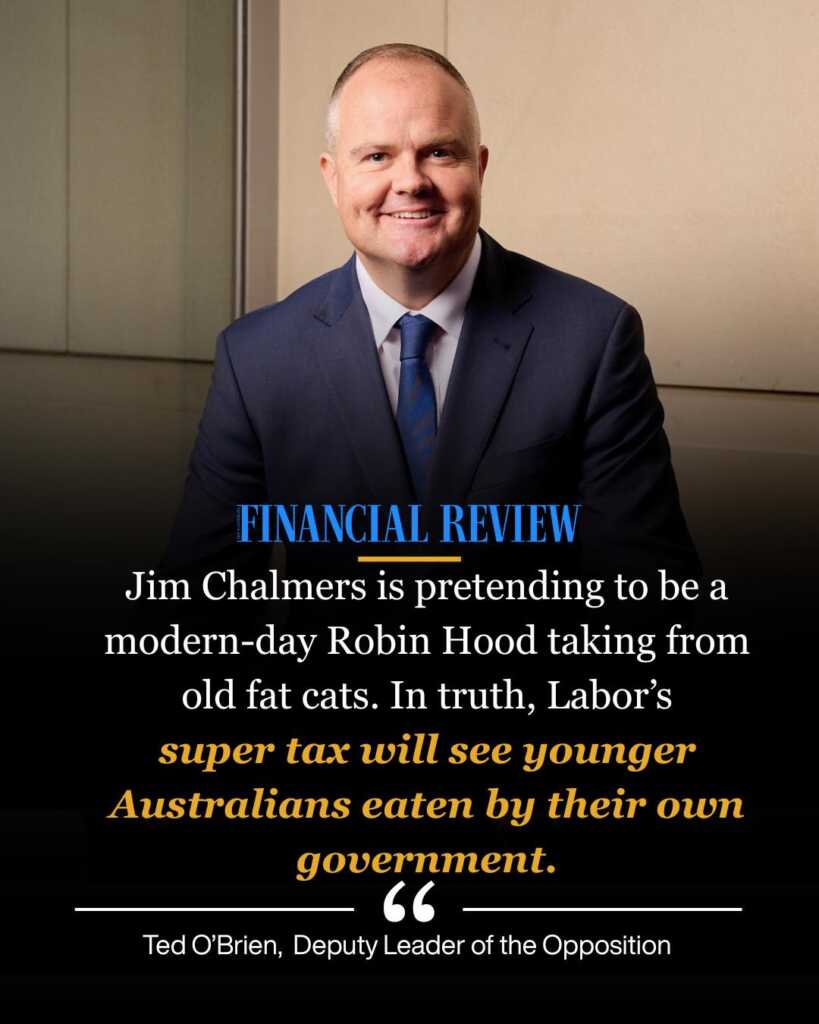Opinion Piece
‘Eat the rich’ may be the guiding principle of Labor’s new superannuation tax, but aspirational young Australians will be gobbled up instead.
At first blush, Labor’s new super tax reflects the politics of class conflict in the spirit of French philosopher Jean-Jacques Rousseau whose phrase “eat the rich” warned that the poor may take the heads of the rich who build wealth at their expense.
But this is just clever framing by Jim Chalmers who wants to be seen as a modern-day Robin Hood taking money from old fat cats with multi-million-dollar portfolios to fund the good deeds of government.
However, nothing could be further from the truth.
Labor’s super tax is a blatant tax grab and everyday young Australians will be among those hardest hit.
Failing to index the $3 million threshold for the new tax will see a substantial portion of average full-time earners in their 20s paying the tax before they retire, according to AMP’s deputy chief economist.
And we know that this is part of Chalmers’ attempts to fund his big spending spree, as Treasury has stated non-indexation will “contribute to the sustainability of the system over time”.
No indexation of Labor’s super tax will punish today’s youth over time, but it is Labor’s decision to tax unrealised capital gains which will hurt young Australians in the short term.
In designing the tax, Labor foolishly assumed people with lots of money in their super accounts will sit idly by as the government comes along and doubles their tax rate and applies it to theoretical gains – or paper profits – on investments.
Remember Kerry Packer’s words at a parliamentary inquiry: “Now of course I am minimising my tax and if anybody in this country who doesn’t minimise their tax, they want their heads read because as a government I can tell you you’re not spending it that well that we should be donating extra”.
Applying the Packer principle, self-managed super fund (SMSF) holders will inevitably change their behaviour to minimise exposure to this new tax.
As a result, young Australians will be hurt.
Firstly, it will be harder for young Australians to start their own business.
New CommBank research shows Millennials and Gen Z business owners drive Australian entrepreneurship, accounting for 62 per cent of all new businesses in retail trade openings in the 12 months to 31 March 2025.
Many of these start-ups rely on SMSFs.
Start-ups typically take years to turn a healthy profit, and around 60% end up failing.
Under Labor’s plan, a SMSF holder investing in a start-up may be required to pay money to the ATO from Year 1 for a venture whose value increases but never delivers a return.
To avoid this unfair tax grab, SMSF holders will invest less in start-ups.
Secondly, fewer job opportunities in high growth companies will exist for young people.
According to the Journal of Financial Economics, young people are also attracted to high-growth companies because they offer greater potential to innovate and higher wages.
For investors, these companies are high risk but offer high returns.
The more capital invested, the more opportunities open for young Australians.
However, by taxing unrealized capital gains, these high-growth companies become less attractive for SMSFs because, like start-ups, taxes will be likely owed before returns come in.
In effect, Labor’s tax will suffocate patient capital from SMSFs and starve aspiring young workers from getting their start in smaller high-growth companies.
Other investors may also be turned off, fearing it is only a matter of time before the government applies its new tax principle beyond superannuation.
Thirdly, it will be harder for young Australians to own their own home.
The Great Australian Dream of home ownership is already beyond reach for many. Placing a deposit on the average home, for example, took six years in the early 1990s but now takes more than twelve years.
It is estimated that nearly $155 billion could move out of SMSFs to invest in the housing market due to Labor’s super tax.
If, hypothetically, all this $155 billion went into new home completions at $1 million a home, this reallocation would snap up 155,000 new builds or nearly 1.5 years of supply.
Prices would increase, crowding out even more young aspiring home buyers.
Under Sussan Ley’s leadership, we’ve been clear – the Opposition will be constructive where we can and critical where we must. On this one, only criticism is warranted.
Labor’s super tax won’t eat the rich, but eat the young by denying their aspirations in the short term and stealing their savings in the long term.
